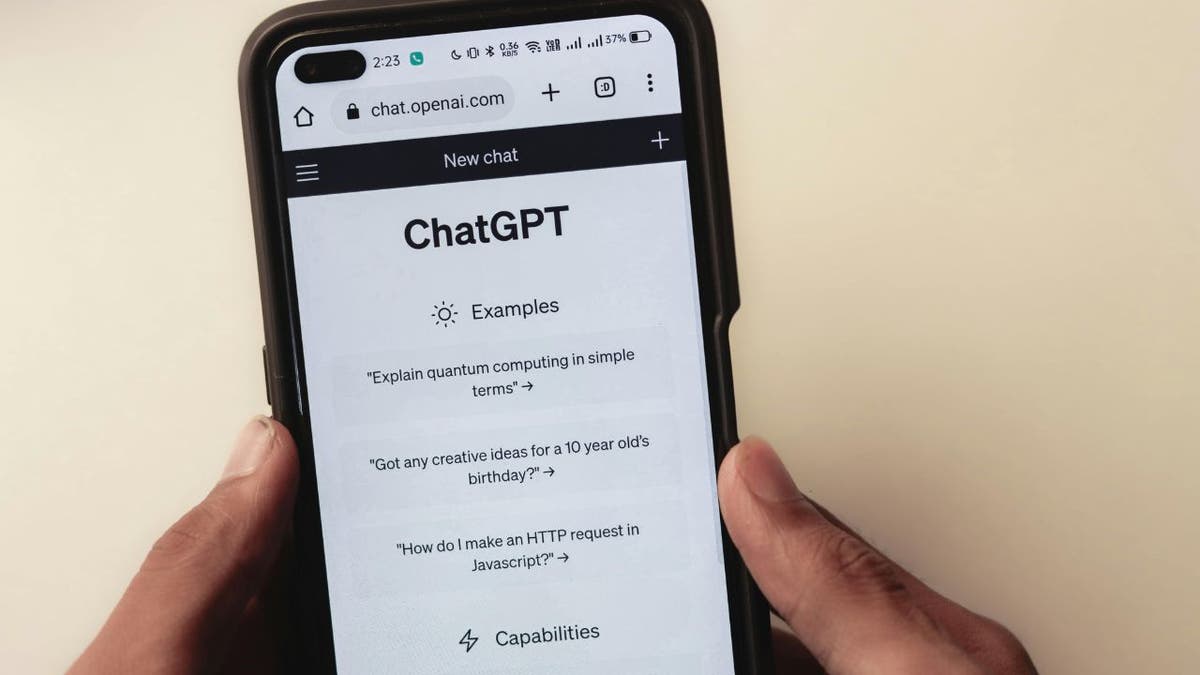Scammers can exploit your data from just 1 ChatGPT search

ChatGPT and other large language models (LLMs) have become amazing helpers for everyday tasks. Whether it’s summarizing complex ideas, designing a birthday card or even planning your apartment’s layout, you can get impressive results with just a simple prompt. But as helpful as these AI tools are, their convenience comes with hidden risks, especially when it comes to your personal privacy.
A man using ChatGPT on his laptop (Kurt “CyberGuy” Knutsson)
How these tools work and why that matters
If you haven’t tried an LLM like ChatGPT before, here’s the gist: They’re advanced language processors that chat with you through text. No special commands or coding needed, just type what you want to know or do, and they respond. For example, asking “Why is the conclave kept secret?” will get you a detailed explanation in seconds.
This simplicity is what makes LLMs so useful, but it also opens the door to risks. Instead of harmless questions, someone could ask for a detailed profile on a person, and the model might generate a surprisingly thorough report. While these tools have safeguards and often refuse certain requests, clever phrasing can sometimes bypass those limits.
Unfortunately, it doesn’t take much effort for someone to use ChatGPT to gather personal information about you. But don’t worry, there are ways to protect yourself from this kind of digital snooping.

A person using ChatGPT on their phone (Kurt “CyberGuy” Knutsson)
WHAT HACKERS CAN LEARN ABOUT YOU FROM A DATA BROKER FILE
How to stop it
These AI tools don’t just pull information out of thin air. They need to access real online sources to work. In other words, your data is already out there on the internet; AI tools just make it easier to find. And if you look at the sources, most of the information you wouldn’t want shared online, like your address, relatives and so on, is made public by people-search sites. Other sources include social media, like LinkedIn and Facebook, as well as public databases. But none of them are as invasive as people-search sites.
Let’s see what you can do to limit how much of your information is exposed online.

A woman using ChatGPT on her laptop (Kurt “CyberGuy” Knutsson)
THINK YOU CAN DELETE YOUR OWN DATA? WHY IT’S HARDER THAN YOU THINK
Essential steps and precautions to protect your privacy
To effectively safeguard your personal information from being exposed or misused, it’s important to follow these steps and adopt key precautions.
1) Opt out of people-search sites one by one
Although not all people-search sites are required to offer it, most of them do provide an option to request an opt-out. But that comes with a few challenges.
Where to start: Identifying people-search sites that expose your personal information
There are hundreds of people-search sites registered in the U.S. Going through each and every one is, realistically speaking, impossible. You’ll need to narrow your search somehow.
Using AI tools: How to find and list data broker sites with your personal data
Use AI tools and ask them to run a deep search on yourself. It’s not a perfect or complete solution; LLMs tend to shorten their responses to save resources. But it will give you a good starting point, and if you keep asking for more results, you should be able to put together a decent list of people-search sites that might have your profile.
Submitting opt-out requests: How to remove your information from people-search sites
Now, you’ll have to go through each of these people-search sites and submit opt-out requests. These usually aren’t complicated, but they’re definitely time-consuming. The opt-out forms are typically located at the bottom of each site, in the footer. The naming can vary from “Do Not Sell My Info” to “Opt-Out” or something similar. Each people-search site is a little different. Opting out of every people-search site that exposes your personal information is a mammoth task. I’ve discussed it in more detail here. Alternatively, you can automate this process.

A woman using ChatGPT on her laptop (Kurt “CyberGuy” Knutsson)
DATA REMOVAL DOES WHAT VPNS DON’T: HERE’S WHY YOU NEED BOTH
2) Opt out using data removal services
Data removal services are real-time and energy savers when it comes to protecting your personal information online. The way these services work is simple. They send hundreds of data removal requests on your behalf to people-search sites you might not even know exist but are still exposing your data. And with some services, the process goes even further than that.
People-search sites aren’t the only places exposing your personal information without your knowledge. In fact, they’re just a small part of the larger data broker industry.
There are marketing, health, financial, risk and many other types of data brokers trading your information. Your data is a commodity they use to make a profit, often without you even realizing it.
Data removal services have taken on the challenge of fighting this threat to your privacy. They continuously scour the web, looking for your profiles. This way, you can just sign up and let them handle the work in the background. And here’s the best part: They take about 10 minutes to set up, roughly the same time it takes to opt out of a single people-search site.
- Go to a data removal service that fits your needs
- Choose a subscription plan
- Provide the minimal information needed for them to effectively locate your profiles on people-search sites
And that’s it. The removal process is entirely automated and requires little to no effort on your part. With this small initial effort, you may save yourself from privacy-related risks, including scams and even identity theft. But what if your data is exposed on a people-search site not covered by any data removal service?
Every removal service out there has limitations on the number of data brokers it supports. It’s not about a lack of effort; it’s mostly because brokers are generally unwilling to cooperate, to put it mildly. But there’s a way to address this issue without going back to manual opt-outs. The top names in the data removal industry now offer custom removals. In simple terms, this means you can ask them to remove your personal information from websites not currently covered by their standard plans.
The catch is that you’ll need to do the research yourself and point out which sites are exposing your data. It’s not as convenient as having everything done automatically, but it’s a relatively minor inconvenience for the sake of your online privacy.
Check out my top picks for data removal services here.
3) Be careful what you share with AI tools
Being mindful of the information you provide to AI tools is the first and most crucial step in protecting your privacy. Don’t share sensitive details such as your full name, home address, financial information, passwords or any other personal data that could be used to identify or harm you or others.
4) Secure your AI accounts
Protecting your AI accounts from unauthorized access helps keep your interactions and data safe. Always use strong, unique passwords and consider using a password manager to generate and store those complex passwords. Enable multifactor authentication whenever possible to add an extra layer of security. Regularly review your account permissions and remove access for any devices or applications you no longer use. Get more details about my best expert-reviewed password managers of 2025 here.
5) Review and tighten social media privacy
Adjusting your social media privacy settings can greatly reduce the amount of personal information available to data brokers. Make your profiles private, limit who can see your posts and be selective about accepting friend or follower requests. Periodically audit your privacy settings and remove any unnecessary third-party app connections to further minimize your exposure.
6) Use strong antivirus software
Protecting your devices with strong antivirus software adds an essential layer of security against digital threats. Antivirus programs defend against malware, phishing and identity theft. Be sure to choose reputable software and regularly update it to stay protected against the latest threats. Get my picks for the best 2025 antivirus protection winners for your Windows, Mac, Android and iOS devices.
7) Use alias emails for opt-outs and online forms
Using a dedicated email address for opt-outs and online sign-ups helps reduce spam and protects your primary email. This practice also makes it easier to track which sites and services have your contact information. If your alias email becomes compromised, you can quickly change it without disrupting your main accounts. See my review of the best secure and private email services here.
Get a free scan to find out if your personal information is already out on the web.
Kurt’s key takeaways
Large language models like ChatGPT are transforming how we work, create and solve problems, but they also introduce new privacy and security risks that can’t be ignored. As these tools become more powerful and accessible, it’s up to each of us to take proactive steps to safeguard our personal information and understand where our data might be exposed. By staying alert and making use of available privacy tools, we can enjoy the benefits of AI while minimizing the risks.
Should OpenAI be held legally accountable when its tools are used to collect or expose private data without consent? Let us know your experience or questions by writing us at Cyberguy.com/Contact. Your story could help someone else stay safe.
For more of my tech tips and security alerts, subscribe to my free CyberGuy Report Newsletter by heading to Cyberguy.com/Newsletter.
Ask Kurt a question or let us know what stories you’d like us to cover.
Follow Kurt on his social channels:
Answers to the most-asked CyberGuy questions:
New from Kurt:
Copyright 2025 CyberGuy.com. All rights reserved.



